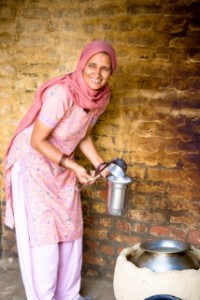July 2012
Work for All Supports: Women in Business
 Work for All is supporting the United Nations Development Programme (UNDP). One of it’s projects in India transforms poor rural women into successful business managers. Pushpa Maurya is a 35- year-old mother of two. She is currently managing a bulk milk chilling center. This center collects milk from 56 villages and supplies about 2000 liters of milk to the state every day.
Work for All is supporting the United Nations Development Programme (UNDP). One of it’s projects in India transforms poor rural women into successful business managers. Pushpa Maurya is a 35- year-old mother of two. She is currently managing a bulk milk chilling center. This center collects milk from 56 villages and supplies about 2000 liters of milk to the state every day.
Ten years ago, Pushpa Maurya joined a self-help group in the village of Chak Padri of Uttar Pradesh. Eight years later, the UNDP set up a pilot project in three of the poorest districts of Utter Pradesh, opening doors for women in business.
Under the UNDP, this project, called the IKEA Foundation’s Swaayam initiative, seeks to empower women socially, economically and politically, through business management and financial literacy training. They have educated over 12,000 women and created more than 4,000 entrepreneurs. Pushpa, and other women like her, have learned the power of the collective and how to eliminate the middleman, who was taking the bulk of their profits. Along with 9,000 other women dairy farmers, Pushpa formed the producer company Swaayam Ksheer (Ksheer means milk in Hindi), in November 2011. Each member holds an equity stake in the company, which has now grown to almost 12,000 members.
This pilot project was so successful that the initiative is now being expanded to reach 2.2 million women. Caitlin Wiesen, UNDP Country Director says, “by building the capacities of women like Pushpa, and supporting them to set up viable businesses, UNDP and the IKEA Foundation hope to lay the ground for lasting institutions and transformational change.” – Melissa Leonard
OUR STANDARD OF LIVING LINKED TO SYSTEMIC POVERTY
 Dear reader,
Dear reader,
I hope those of you in Canada are taking a moment to reflect on how lucky we are to celebrate Canada Day in such a great and stable economy.
My oldest daughter, Melissa, just moved to Brazil. As a qualified school teacher, she will earn less than 50% of what she was paid in Canada to perform the same tasks.
Is teaching in Canada twice as hard as teaching in Brazil? No. The difference is that we, in North America, live in a mature economy. This entitlement to higher pay, based on where you live, is changing because the world is so connected. The world is able to exchange most goods and services from anywhere. This means transferable jobs will go to where the labor market is cheapest. In order to maintain our standard of living, we need to alleviate systemic poverty. This will raise the standard of living everywhere, and encourage innovation and consumption. This is the only way we can maintain the high standard of living we are accustomed to in North America today. – Jeremy Leonard
